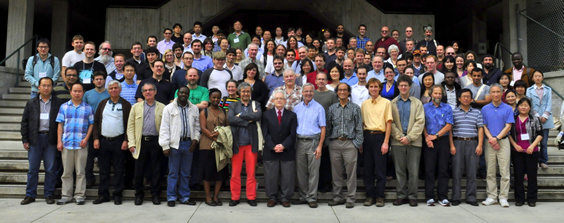EVERYTHING DISPERSES TO MIAMI
THE ROLE OF MOVEMENT AND DISPERSAL IN SPATIAL ECOLOGY, EPIDEMIOLOGY AND ENVIRONMENTAL SCIENCE
December 14 - December 16, 2012
The University of Miami
Coral Gables, Florida

(Click the above picture to download the full-size image.)
Purpose
The movement and dispersal of organisms have long been recognized as key components of ecological interactions and have figured prominently in mathematical models in ecology. More recently, dispersal has been recognized as an equally important consideration in mathematical epidemiology. The University of Miami has become a world leader in employing mathematics to understand the role of movement and dispersal in ecology, epidemiology and environmental science, with major contributions to the study of such important issues as the evolution and ecological effects of dispersal in spatial ecology, the impact of human movement on vector-borne diseases, the effect of global movement in communicable diseases, the cost of movement in ecological applications, and accounting for spatial effects in environmental management. "Everything Disperses to Miami: The Role of Movement and Dispersal in Ecology, Epidemiology and Environmental Science" (EDM) offers a unique opportunity to promote further synthesis between mathematical ecology and mathematical epidemiology and to influence future research directions. EDM is a natural outgrowth of several previous events: the 2005 "Workshop on Spatial Ecology" at the University of Miami that kicked off the University of Miami Institute for Theoretical and Mathematical Ecology (ITME) and lead to the influential 2009 Chapman Hall/CRC volume of essays Spatial Ecology, the MBI 2005-2006 Emphasis year on Evolution and Ecology (specifically Workshop 4: Spatial Ecology March 13-17, 2006) and most especially the just completed July 2011 Banff International Research Station (BIRS) workshop on "Emerging Challenges at the Interface of Mathematics, Environmental Science and Spatial Ecology".
The workshop will also give us a very opportune way to celebrate the 60th birthday of Chris Cosner. Chris will turn 60 on June 3, 2012. We will conclude the workshop with a panel discussion on new directions of research at the interface of mathematics and biology on the role of dispersal in ecology, epidemiology and environmental science, and Chris has agreed to lead this discussion. We will also hold a workshop banquet in honor of this milestone.
Principal Speakers
Don DeAngelis, University of Miami and the United States Geological Service
William Fagan, University of Maryland and National Socio-Environmental Synthesis Center
Suzanne Lenhart, University of Tennessee and National Institute for Mathematical and Biological Synthesis (NIMBioS)
Yuan Lou, Ohio State University and Mathematical Biosciences Institute (MBI)
Wei-Ming Ni, University of Minnesota, East China Normal University (ECNU) and Center for Partial Differential Equations ECNU
Jianhong Wu, York University and Centre for Disease Modeling
Sponsors
University of Miami Institute for Theoretical and Mathematical Ecology (ITME)
University of Miami Department of Mathematics
University of Miami College of Arts and Sciences
University of Miami Office of the Vice Provost for Research
Mathematical Biosciences Institute (MBI) at Ohio State University
National Science Foundation
Participation
There will be a number of special sessions in addition to the plenary talks. Special session participation is by invitation only. However, any researcher active in the field is welcome to register and attend the workshop. We particularly encourage graduate students, recent Ph.D.'s and underrepresented groups to participate. We will have some funds to facilitate participation by junior researchers.
Organizing Committee
Stephen Cantrell (University of Miami), Suzanne Lenhart (University of Tennessee and NIMBioS), Yuan Lou (Ohio State University and MBI), Shigui Ruan (University of Miami)
For Additional Information
Contact the organizers at edm@math.miami.edu.




